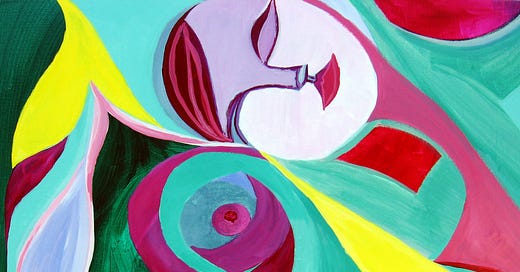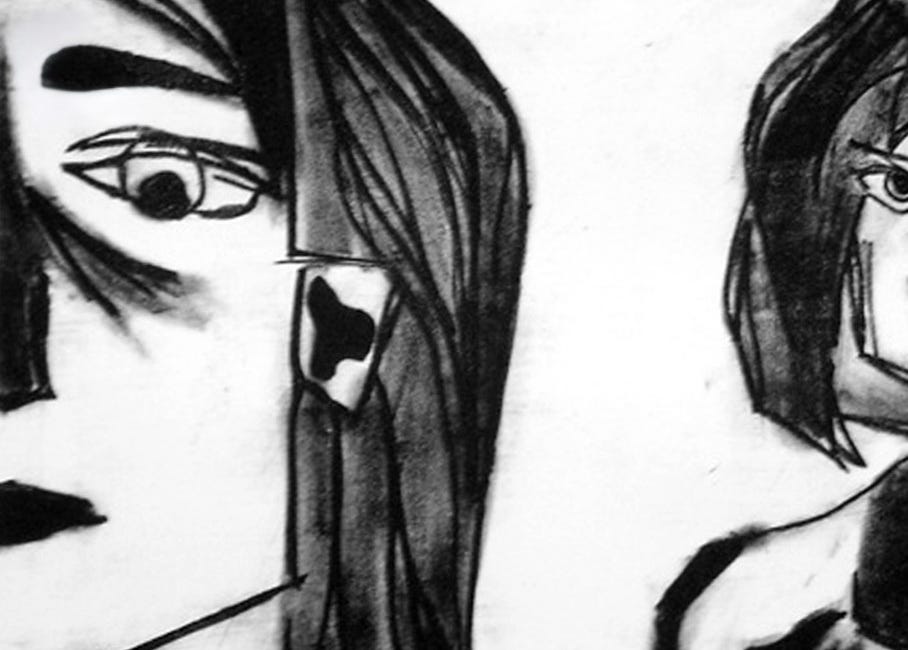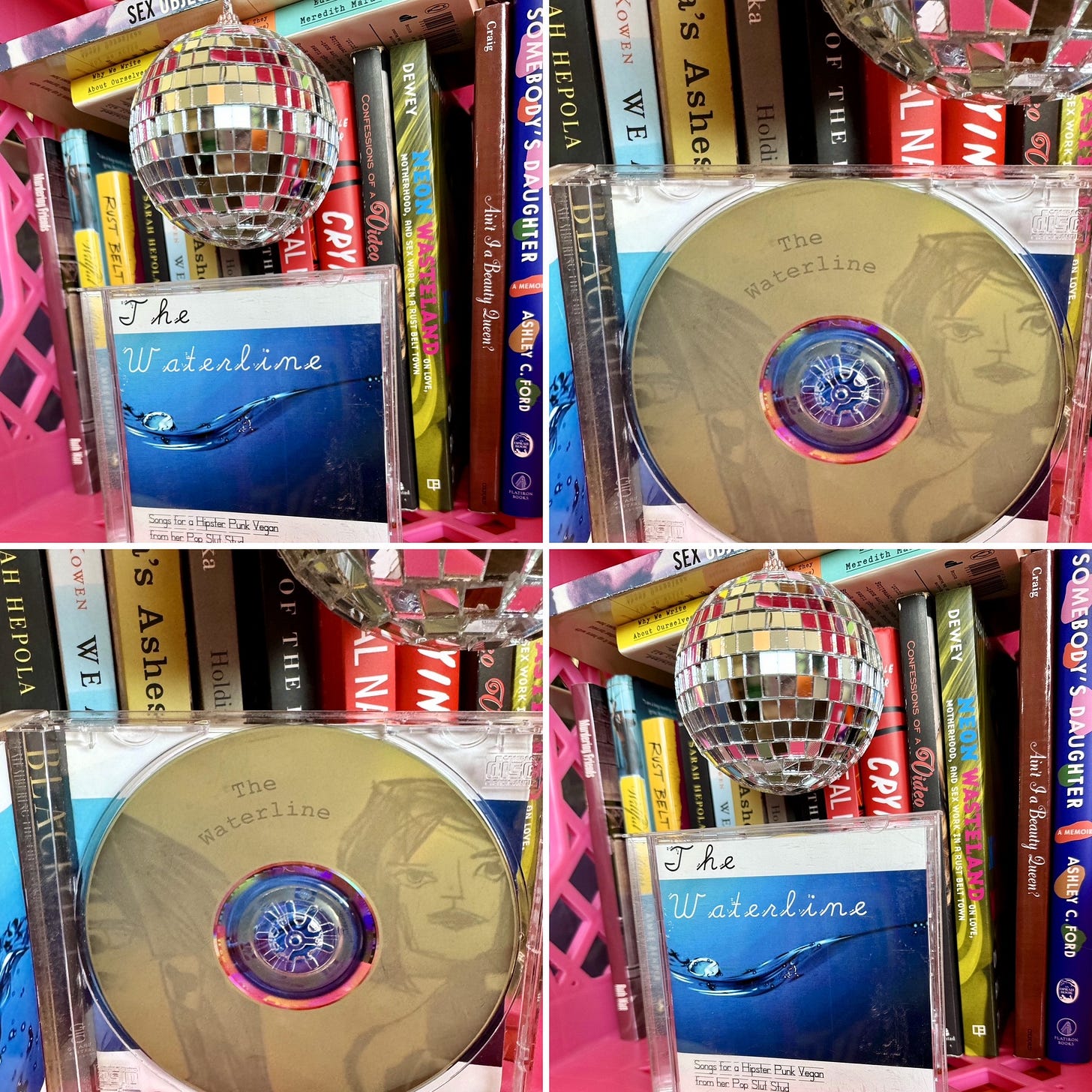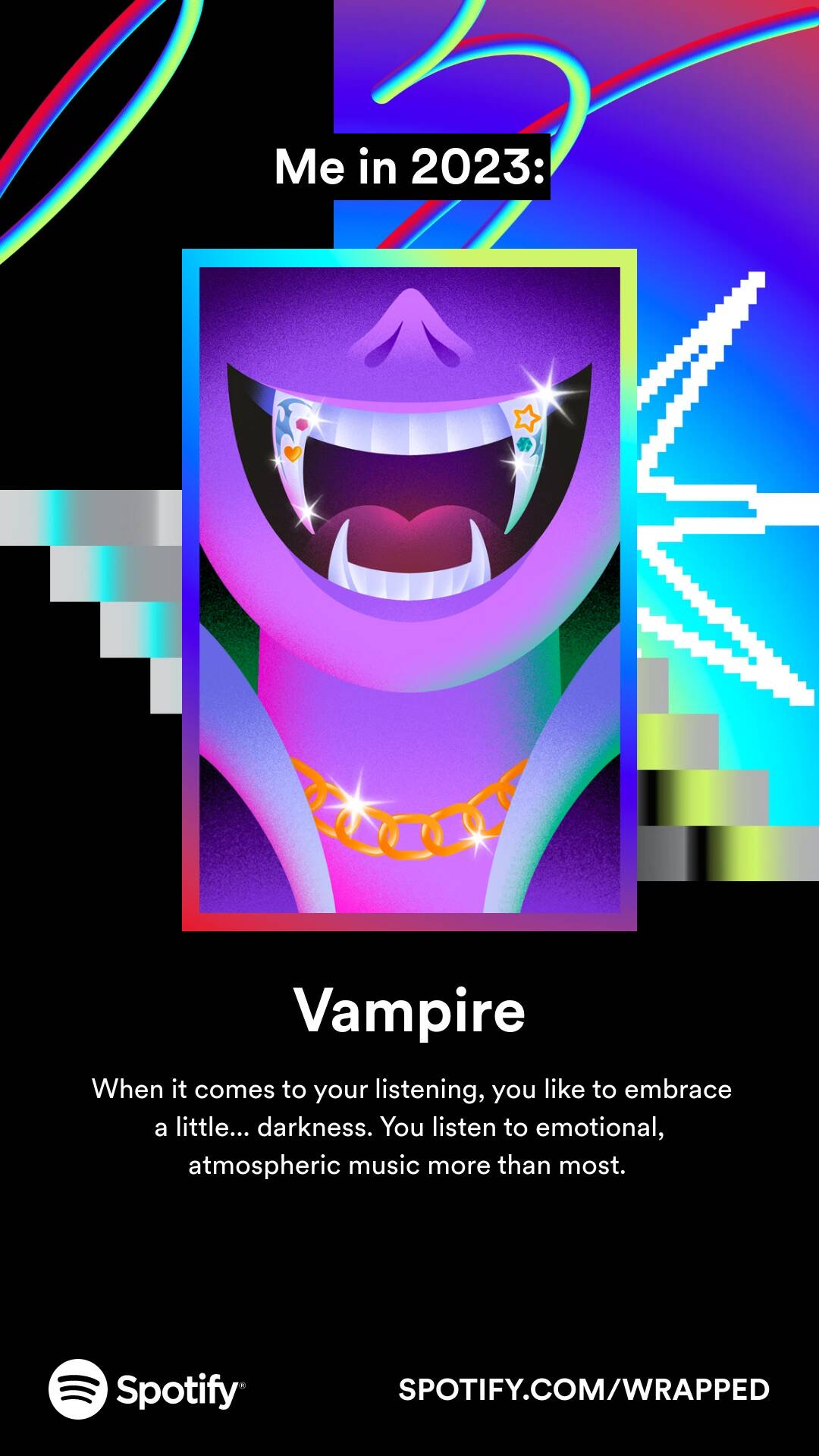Hi beautiful people,
I wrote “Of Monsters and Magic” in a fever dream state, and while I returned to work last week after testing negative for COVID-19, my body and brain still feel a bit dazed and drained. As a result, post-publication I cut some sections from the piece for the sake of brevity, which is not my strong suit in sickness or in health. While the threads connecting club culture to mental health had to go, because my focus wound up on Chappell Roan and Scary Aesthetics, I want to elaborate on them here. (If you read the original email or listened to the audio, a few anecdotes will be familiar, but I hope they feel fresh in their new context.) Let’s dive in.
Of Monsters and Magic
I heard you like magic/ I've got a wand and a rabbit —Chappell Roan, "Red Wine Supernova"
***
When a customer tells me I look like Lady Gaga, my first girlfriend floods my mind, memories of our relationship like static from submerged speakers. The customer keeps talking, but I am no longer with him. Instead, I am back in grad school, walking to the track across the street from student housing. Being careful not to veer into the bike path, as I move in zigzags like a drunken chess piece, I chat on the phone with a childhood best friend. She bemoans that she matched with someone whose dating profile, upon further inspection, includes “Godard films and fake tits” among his interests. She thinks he’s kidding about the latter—a plausible explanation given the pretension of the former—but our discursive analysis proves inconclusive.
It turns out that a few years later I will be the Maid of Honor at this bestie’s wedding, so it would have behooved me to slow down and realize fake tits guy thought he was being funny in a nerdy postmodern way. He is a sweetheart, but also an English PhD student like me, so that tracks. As per usual, though, I’m running super late. Glancing at the gaudy watch I inherited from my beloved Gigi (alongside some dolls made of felt, sequins, and super glue), I add an erratic skip to my step. Beads of sweat form on the bridge of my nose as I hold steady my giant polyester hair bow à la 2008 Lady Gaga. Apologetically wrapping up the call, I attempt with my free hand to smooth my black hair, frizzy from a hostile encounter with a styling tool.
I didn’t intend to half-ass my Gaga look; however, my blow dryer has completed a job only once, when I lent it to a friend who needed to caulk her bathtub. While I can spend hours on clauses or commas, my general impatience and tardiness leads me to approach certain tasks with an air of annoyance or unbridled rage. I look around for a reflective surface to make sure I don’t have red lipstick on my teeth, but I spot my girlfriend in the crowd first. I flip my phone shut. She smiles and waves her arms.
“Look… at… you!” She emphasizes each word, pausing to take me in. Playing along, I spin around, discreetly running my tongue over my front teeth before nodding my head and bending my knees outward, holding the folds of an invisible gown.
“Wow. My little Lady Gaga.”
I beam at her with lipstick-smeared teeth. She rubs it off with her thumb before kissing me, my chin cupped in her palm. I feel her heat, the stiff fabric of my skinny jeans creasing on the back of my knees.
***
I had casually dated and slept with women before my long-term girlfriend, we’ll call her Hailey. But she was the first woman I introduced to my parents, spent the holidays with, went on road trips with, fell deeply in and out of love with. We broke up on the plane ride home from the Modern Language Association conference the year she went on the job market. We even had a captive audience for our L-Word drama, as an unwitting witness sat in our row of three. Poor guy. If you’re reading this right now, please accept my sincerest condolences.
The day before, I chased Hailey through the snowy streets of Boston. She was so freaked out about an imminent job interview she tried to run off like she had just seen the Ghost of Christmas Past. Perhaps in “aggrieved professor emeritus from beyond the grave wearing a tweed blazer with leather elbow patches, quoting Dante’s Inferno” drag. As odd as this may sound, it’s not uncommon for the body to physically reject the existential abyss that is the academic job market. After eight years, mine sure as hell did. I’d call it a survival instinct against an endless circling descent.
Imagine you’ve spent damn well near a decade of your adult life studying one thing while treading water in the deep end of deferred undergrad debt, only to be told that the odds of making a career out of that thing are not, in fact, ever in your favor. Every interview feels like a dissection not of your dissertation but of your questionable decision-making, an interrogation of your very identity. Because, the truth is, that thing has crept into your core, become your purpose, even as you disavow both the neoliberal university and the simplistic identity politics it produces. Such siloing of identity into neat little packages for cover letters and personal statements is a far cry from the Black feminist theorists who denounced racial capitalism and the defanging of radical ideas born of social movements.
But on the market, you become the product to which you yourself are indebted. The debt you hate, the debt that demands you perform the neoliberal subject you critique.1 The community organizing you do, have long been doing (emphasis here on community), gets repackaged to you as individualized service and volunteerism. Your intellectual project, in time, will write your position out of existence. Meanwhile, the whistleblower retaliation you ultimately face—because you refuse to stay silent about the gross mistreatment of survivors—waits in the wings to destroy the rest of you. Until then, you are a walking contradiction of weary smiles, ready to combust.
That got a little specific, but to my original point job search committees conduct these preliminary interviews in hotel rooms, at least they did a decade ago. Candidates must consider the awkwardness of describing their research interests while sitting on a queen bed, feet not touching the floor. Better wear pants, heeled boots.
Hailey got the job at the Ivy League university. All I got was a cold and a broken heart. Breaking up on a cross-country flight was a fittingly messy end to a messy relationship. I believe we really loved each other, but we were younger then and both immature in our own ways. Once, I got jealous over, like actually upset about, her hypothetical attraction to dragons. I wish I could make this make sense.
She was not the first or last person to misdiagnose my severe ADHD as a personality or mood disorder, rather than a neurological condition that affects daily baseline executive functioning. Emotional regulation is much more challenging for us than neurotypical people, but they can’t understand why exactly, because—funny how this works—they don’t live inside our brains. Instead, a million little rabid squirrels do. I perceive and feel intensely. Sometimes—despite my best efforts—my senses and emotions get so overwhelming that I melt down. Rather than get curious about what can help us in these frantic moments, people tend to pathologize us. To them, our invisible but very real disability looks like a temper tantrum.
I truly don’t hold Hailey’s wielding of the DSM-V against me, because at the time I was undiagnosed and self-medicating my unrelenting brain chatter and rejection sensitive dysphoria with booze, which only made matters worse. I loved her, and I also needed to grow. A lot. The breakup was one of those mutual kinds where both parties alternate between accusing the other of initiating the end. We later patched things up, which I was happy about seeing as how she was an important person in my life with whom I shared happy memories and scholarly collaborations.
A few years later, though, Hailey emailed me asking if I knew [insert name of new girlfriend I can’t remember]. I replied honestly that I did not. Turns out new girlfriend, we’ll call her Liar, had been spreading rumors all over the small world that is queer academe. She alleged I had been harassing her on Facebook. While she seemed skeptical of this allegation, Hailey asked me to account for it. I told Hailey she should ask the same of the accuser, literally, by requesting the receipts. I knew there were none.
Baffled, I started to worry maybe my account had been hacked? But that didn’t make any sense. Why would a hacker harass my ex’s new love interest, whom I had never seen or heard of, years later? Frankly, I was a ho in grad school and since our breakup, had dated more women than I could count on one hand. That is to say, we had made peace, moved on, and lived very separate lives.
While I have no doubt done weird and regrettable shit in my life, the notion that I would vengefully stalk someone is absurd. I couldn’t even work up the nerve to slash an abusive ex-boyfriend’s tires after he stole from me, like literal things of value from my apartment. Mind you, these tires were on the car for which I (very undemurely, very unmindfully) co-signed a loan that almost ruined me. Even so, my best revenge was angry slash-y thoughts and thirst traps.
Despite that baffling accusation, I can still fondly reflect back on my relationship with Hailey. I am grateful for the ways she supported me as I leaned into my queerness, even making me a super gay CD. Yes, a CD, because I resisted getting a smart phone until my new boss, the chair of the English department, demanded it when I started my first and only salaried job in 2015. Heaven forbid I miss a work email.
This same boss, a colleague informed me, complained about my hire because I was, in the chair’s words, “too young and can’t control a classroom.” As if I hadn’t won campus-wide teaching awards during my six years of prior experience. As if students need to be controlled. These assumptions reek of sexism directed at me—as the ageism in this scenario is born of it—and racism directed at students in a so-called “Minority Serving Institution.” The chair also reportedly mocked me for submitting a reimbursement receipt for gummy bears I purchased at the airport. Forgive me for not understanding that “all travel expenses paid” excludes unsophisticated culinary tastes.
Putting aside yet another hater, every aspect of this gift was thoughtful—from the insert design to the disc itself, which she printed with one of my photographs-turned-sketches-turned-lithographs-turned-tattoos. The CD is dated December 2011 so it must have been a birthday gift. She even gave it a title, “The Waterline,” after a love poem I wrote for her (appended here). The track list is mostly songs we danced to at Wildcat Lounge, nicknamed the Shitty Kitty. Songs like:
“Heavy Metal Lover” and “You and I” by Lady Gaga; “Closer” and “Miss Independent” by Ne-Yo; “We Found Love” and “You Da One” by Rihanna; “Somebody to Love” by Justin Bieber (lesbians love Justin Bieber, especially when other lesbians look like him); “Ride” by Ciara (featuring Ludacris); “Down on Me” by Jeremih (featuring 50 Cent); and “Lick It” by God-Des and She.
Basically, the gay club I got gayer in rocked hard to 2000s bangers. Hailey was a self-professed “pop slut,” whereas I never would have guessed my tastes might approach the genre until I fangirled over Billie Eilish’s music. Even Spotify (while a fraught platform) accurately assessed that I’m a vampire, favoring “emotional, atmospheric music more than most.”
Vampiric proclivities aside, if asked to describe my musical tastes, I would probably say “sad girls with guitars.” Take an album in my rotation, any album, and my favorite song will undoubtedly be the most depressing one. I’d love somebody to prove me wrong, but I can’t think of a single exception. When I was a little girl “Silent Night” was one of the first pieces I learned on piano. I still remember replacing the overhead lights with candles in the nook between the living room and kitchen where the upright piano had been hauled in from a garage sale. Swaying and shaking my hair like Meat Loaf performing the most cryptic lyrics known to music history, I played with such melodramatic abandon that I brought myself to tears.
This was not histrionics, as I would be accused of so often throughout my life; it was an intimate space for emoting, something that was all my own, something that felt safe, felt essential to my survival. Like writing. Now I know these self-soothing moments have a name, “glimmers,” the opposite of triggers.2 All of this to say I’m more of a Brandi Carlile and Holly Miranda kind of sad slut than a pop one, but the music on this CD reminds me of another glimmer—dirty dancing in the gay bar, music a pulse coursing through my body like an extra heartbeat. An amplification of aliveness in and through a communal space created for release and revival.
***
I approach a man sweating off a navy suit, his greasy hair long enough to be slicked into a middle part. I’ve kept tabs on him, but decide to give him a shot after he makes a trip to the ATM.
“No, sorry, I don’t speak English.”
“What do you speak?”
“Where do you think I’m from?”
I scan his face. His features and accent seem familiar but I’m quite certain that any wrong answer will sound racist.
“I don’t know… but I speak French and Spanish, if that helps?”
I learned French in junior high from a talking pineapple on a TV program, which my teacher, Madame Hopper, played on an ancient TV and VCR unit painstakingly wheeled into the classroom. I also translated Foucault for my PhD language exam, but philosophy has lots of big words and fewer conjugations. I was decent at the subjunctive, a preferred verb tense of philosophers, and remembered reading Madness and Civilization in English, so I aced the exam. After learning some Spanish, though, my French is fucked. I substitute “parce que” with “porque” and otherwise randomly pronounce vowel-heavy French words with a Spanish staccato. Two beautiful but very different sounding romance languages, one more legato and the other an energetic ebb and flow. I sound like I’m trying to play a fiddle with a flute.
Surprise! Middle-part guy busts out his phone to display the Eiffel Tower. Okay, he’s French, although that seems suspiciously touristy. Ruling out those catchy “Lady Marmalade” lyrics, my mind starts melting. I struggle to produce anything beyond a tentative, “Je parle le français. Comment ça va?” He responds and I’m back in French class, not knowing what in god’s name is going on, his sentences a river of vowels with no beginning or end.
“Uh…”
“Non!” He erupts, before exclaiming, now in English, “No can do.” He slithers away. I never thought I’d be judged for my poor French oral comprehension in a strip club. Nevermind I have an auditory processing disorder that makes it hard for me to understand any language over speakers bleeding bass.
***
The next guy I approach fist bumps me when I exclaim “Samesies!” as he explains that he has a hard time understanding because of, go figure, his auditory processing disorder. (I really can’t make this shit up. This is how it happened.) I ask if he wants a dance. He says he can’t, because last time he tried to pull down a dancer’s thong and "they didn’t like that.” No shit. Unfortunately he reveals this after I had to endure him saying, “You’re so cute…” He pauses, searching for the right simile. His eyes light up. “Like a hamster!”
“That is the worst thing anyone has ever said to me!” I shriek, laughing at the absurdity. It is definitely not the worst thing anyone has ever said to me.
***
Dancers complain about customers after close. I chime in, “Well I got likened to a hamster!” I speak too formally in all contexts, like a little Victorian ghost boy.
A girl packing up her things shakes her head. “Sometimes they just want to be mean,” she scoffs. I reply, “The sad thing is, I think he meant to compliment me.”
“Well, he must be autistic then.” I’ve spent the past three hours giving lap dances to Swedes, so I am honestly too tired to track tonal shifts from generalized post-shift disdain to a specific target. I am trying to process whether she meant this explanation as an insult, and realize—too late—she probably did. Then I remember how, before conversation with hamster guy went haywire, we bonded over our neurodivergence.
I continue smoothing and counting wadded balls of ones.
***
In The Undercommons, Fred Moten and Stefano Harney critique the debt model of late capitalist society, reimagining debt work in the Black radical tradition as “a debt you play, a debt you walk, and debt you love. And without credit this debt is infinitely complex.”3 The emotional and epistemological reorganization of social life must happen not solely at the level of individuals, but at the level of dismantling oppressive institutions. And individuals must reckon with their embeddedness in the violence of social hierarchies, refusing an exceptionalist or defensive stance, both ego-driven forms of historical amnesia.
Through sound, through struggle, people imagine and collectively build new worlds while strategically navigating the ongoing state violence and inherent capitalist crisis of this one. In the face of an unrelenting stream of normalized calamity, debt work is not a payment owed, but a debt you love in recognition of the fact that: “We owe each other the indeterminate. We owe each other everything.”4
***
Is that—could that be—none other than a a dusty Cheeto making a cameo in Chappell Roan’s music video?5 Thanks for making it to the end of this rambling reflection on how music mediates neurospicy proclivities and queer desires in the late capitalist strip club. To mark the occasion, I created a playlist of sufficiently sad songs. Please feel free to peruse my library of playlists with felicitous titles like “Melancholic” and “To All the Girls Who Cry.” My friend Margeaux Feldman gave me their blessing to share a sexy playlist they created that also feels relevant to this writing, and less sullen.
Finally, as promised, I’ve appended “You Are a Waterline,” the sappy sapphic love poem after which Hailey named the music compilation she gifted me—should all this sultry music, aquatic wordplay, and overdone alliteration put you in the mood (LOL).
xx,
Alison
P.S. If you would like to read this sexy lil poem and others in a similar vein, please consider a paid subscription or, as always, message me for free access! I’m grateful when you ‘heart’ and/or share my posts, too! Thank you, truly.
Here I am playing on Moten and Harney’s “debt you love” from The Undercommons (AK Press, 2013).
While there is undoubtedly something cathartic about the psychobilly, punk, and metal music of which I’m also a fan, I am quite sure there is a correlation between how sad songs soothe me, and how loud noises can activate my autonomic nervous system.
Moten and Harney, 63-64.
Moten and Harney, 20.
I really need to stop googling everything as I just learned that according to Urban Dictionary, a dusty Cheeto can refer to a dirty toe or dick. I refuse both definitions. I meant it as a metaphor for life, dammit, not a crude anatomical comparison.
Keep reading with a 7-day free trial
Subscribe to Napkin Manifestos to keep reading this post and get 7 days of free access to the full post archives.






